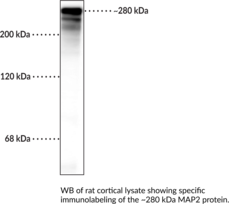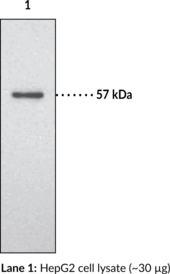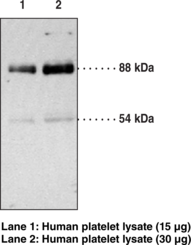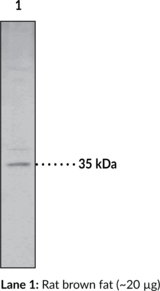Description
Microtubule-associated protein 2 (MAP2) belongs to the microtubule-associated protein (MAP) family of cytoskeletal filament proteins, which includes MAP1-5 and tau.{55112} MAP2 is composed of an N-terminal projection domain that interacts with PKA and a C-terminal domain that contains microtubule binding repeats containing a KXGS motif that is subject to phosphorylation.{55113} Five isoforms of MAP2 are generated through alternative splicing and are found in the cell body and dendrites of neurons, with some isoforms also found in astrocytes and oligodendrocytes of the CNS and in the testis.{55112,55113} MAP2 is expressed in mature neurons, with the MAP2a and MAP2c isoforms expressed in a developmental stage-dependent manner while the MAP2b isoform is expressed throughout development and adulthood.{55112,55114} MAP2 binds to and stabilizes microtubules and increases their rigidity, as well as interacts with F-actin during neurite initiation and with proteins involved in signal transduction.{55113} Phosphorylation of the KXGS motif by MAP/microtubule affinity-regulating kinase 1 (MARK1), MARK2, or PKA decreases the affinity of MAP2 for microtubules, and the detachment of MAP2 leads to microtubule destabilization and disassembly. Decreased levels of MAP2 protein have been found in postmortem brain tissue from patients with a Lewy body variant of Alzheimer’s disease.{55115} MAP2 has been found in cytoplasmic neuronal Lewy bodies colocalized with α-synuclein and ubiquitin in postmortem substantia nigra from patients with Parkinson’s disease.{55116} Cayman’s MAP2 (bovine) Polyclonal Antibody can be used for immunocytochemistry (ICC), immunohistochemistry (IHC), Western blot (WB) applications. The antibody recognizes MAP2 at approximately 280 kDa from human, bovine, mouse, and rat samples.
Synonyms: MAP-2|Microtubule-associated Protein 2
Immunogen: Recombinant bovine MAP2 expressed in E. coli
Formulation: 100 µl of total IgY fraction-purified polyclonal antibody
Isotype:
Applications: ICC, IHC, WB
Origin:
Stability: 365 days
Application|Immunocytochemistry||Application|Immunohistochemistry||Application|Western Blot||Product Type|Antibodies|Polyclonal Antibodies||Research Area|Cell Biology|Cytoskeleton & Motor Proteins||Research Area|Neuroscience|Neurodegenerative Disorders|Alzheimer’s Disease||Research Area|Neuroscience|Neurodegenerative Disorders|Parkinson’s Disease




